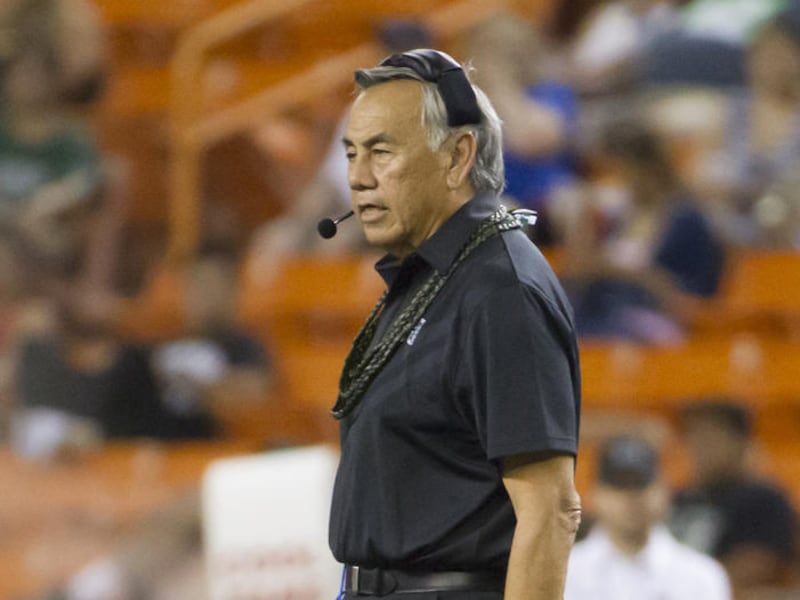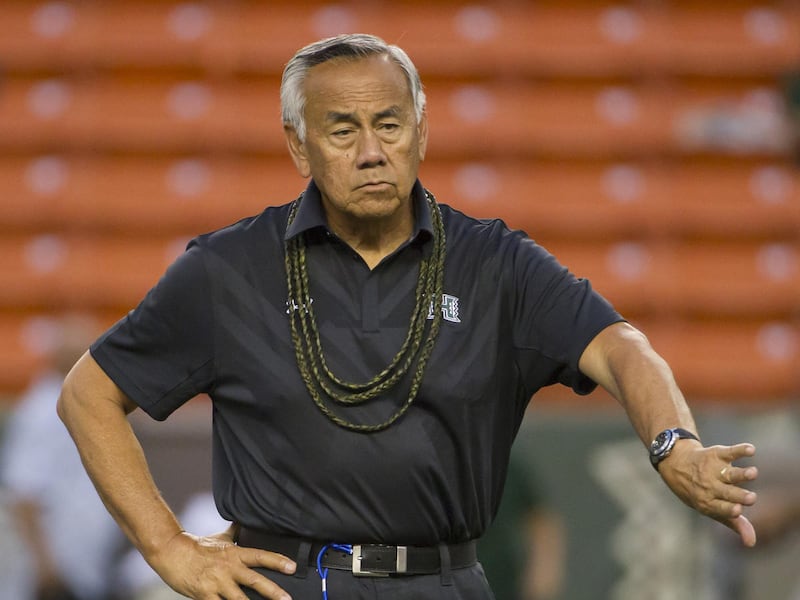It took Norm Chow 41 years to finally get the one thing he coveted most in his career: A head coaching job.
It took him four years to lose it.
At age 65, after decades as an assistant coach, Chow was offered his first chance to be the head coach of a college football team, returning to his native Honolulu to lead the University of Hawaii in 2011. He was fired last week, with a record of 10-36 that included just four conference wins.
Thus, he came full circle, beginning and ending his coaching career in Hawaii (if this is the end). In 1970, after retiring from a playing career in the Canadian Football League, Chow took his first coaching job as head coach at Waialua High on Oahu’s North Shore and won just five of 30 games. Then he moved to BYU to become a graduate assistant and launched what would be a remarkable career as an assistant coach.
"There are two kinds of assistant coaches: Those who want to be head coaches and those who are happy being assistants," Chow used to say while at BYU. He counted himself among the latter, but meanwhile he tried to land a number of head coaching positions and privately fumed when he didn’t get them.
He stayed at BYU 27 years and was an integral part of the Cougars’ glory years. When it became clear he wasn’t going to replace BYU’s legendary head coach LaVell Edwards when the latter retired in 1999, he left the school in a huff.
It was the best thing that ever happened to him.
After nearly three decades in one place, he took six jobs during the next 16 years and became the most famous and reputed (and highest paid) offensive coordinator in college football. He spent one year with head coach Chuck Amato at North Carolina State, where he coached Phillip Rivers and helped turn a perennial .500 program into an 8-4 winner with a prolific pass offense. T-shirts and stadium banners proclaimed, “It’s Chow Time on the Chuck Wagon.”
He then moved to the other coast at the invitation of head coach Pete Carroll to be USC’s OC. During the next four years he coached two Heisman Trophy winners —quarterbacks Carson Palmer and Matt Leinart — and helped USC win two national championships (one was later vacated by NCAA violations).
Chow was A Big Deal. As I recounted in a 2003 profile, TV cameras inevitably showed Chow in the press box, the Great Oz pulling the strings for the offense. Players and coaches raved about him.
"I've had some great coaches," Palmer told the Daily Trojan, "but I guess I kind of saved the best for last because Coach Chow's just phenomenal."
In 2002, an L.A. columnist wrote that he was voting for Chow, not Carroll, as Coach of the Year. Carroll himself called him “arguably the best offensive coordinator in the history of college football, certainly in terms of championships and wins and people he has coached."
Chow was then hired as the OC for the Tennessee Titans and lasted three years. Despite improving the offense with a young quarterback (Vince Young), Chow was fired in 2007.
His best years were behind him, but the jobs kept coming. Three years as the offensive coordinator at UCLA; one year as the OC at Utah; and then the coveted head coaching gig at Hawaii.
Be careful what you wish for. Rule No. 1 for coaches is never take a job in which you can’t succeed. Edwards remembered that when the Detroit Lions pursued him as their head coach; he refused the offer and a considerable pay raise. Certainly Chow knew of the unique challenges that Hawaii faces, chief among them being its location, but he took the job anyway.
Chow wasn’t cut out to be a head coach anyway. He is thin-skinned and easily irritated by fans, media and even other coaches on his own staff. He was so prickly about the media that when his USC team played BYU in 2003 he called his old acquaintances in Provo and told them to offer “no comment” to any reporters who called. During Hawaii’s spring practice in 2014 he abruptly halted all interviews one day because of the presence of a reporter who had written something he didn’t like.
Chow could get away with all that as a coordinator, working with his Xs and Os in his office lab, but not as a head coach. Some coaches are meant to be assistants, as Chow’s own mentor, the late Doug Scovil, discovered. Scovil was an offensive mastermind who made significant contributions to BYU’s program as its OC and quarterback coach in the ‘80s, besides coaching 11 years in the NFL. He failed in his one and only attempt as a college head coach, at San Diego State.
The dismal showing at Hawaii should not obscure Chow’s success as an assistant, which was the result of a perfect storm of events. Chow had the good fortune to be in the right place at the right time, starting with his formative years at BYU, where he had the opportunity to learn from Scovil and later Mike Holmgren, who coached quarterbacks at BYU for four years before going on to win Super Bowls with the Packers and 49ers. Chow also worked with Wally English and Ted Tollner, who also became NFL coaches.
Chow has always credited Scovil for teaching him offensive football, and, to his credit, the young coach worked hard to learn everything he could from him. During team meetings, he took notes while Scovil taught quarterbacks Gifford Nielsen, Marc Wilson and Jim McMahon. He filled dozens of notebooks, even using the same red and blue ink that Scovil used for his notes. During his career, Chow occasionally consulted those old notebooks — marked "Scovil, spring 1977" or "Scovil, fall 1979."
"I rode his coattails for years," Chow told me years ago. "He was very secretive but not with me. He was kind enough to share his ideas with me. We became close. We did things together socially and we played tennis together regularly. And we always talked football. We spent hours talking football. He used to bounce ideas off me. He wasn't looking for answers. He just wanted ideas. What would you do in this situation? What would happen if we did this?" Even years later, Chow said, "Every time I wonder 'What should I do here,' I go back to the those notebooks."
After he left BYU Chow had the fortune of inheriting talented players to work with, and they flourished under his direction. Consider the quarterbacks he mentored: Three Heisman Trophy winners — Ty Detmer, Palmer and Leinart — as well as John Walsh and Steve Sarkisian. He also called the plays for three national championship teams, one at BYU and two at USC.
And then things dried up. Leinart, in 2004, was the last quarterback of note whom Chow coached.
More than a decade later, Chow is out of work, but his body of work undoubtedly would provide him with more coaching opportunities if he chooses not to retire. This time it would be as an offensive assistant coach, which is what he does best.
Doug Robinson's columns run on Tuesdays and Wednesdays. Email: drob@deseretnews.com




